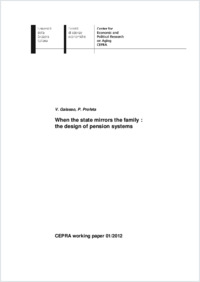When the state mirrors the family : the design of pension systems
- Galasso, Vincenzo Center for Economic and Political Research on Aging (CEPRA), Facoltà di scienze economiche, Università della Svizzera italiana, Svizzera
- Profeta, Paola Econpubblica and Dondena, Università Bocconi, Milano, Italia
-
2012
41 p.
English
We study how the prevailing internal organization of the family affected the initial design of pension systems. Our theoretical framework predicts that, in society with weak family ties, pensions systems were introduced to act as a safety net, while in societies with strong ties they replicate the tight link between generations by providing generous benefits. Using a historical classification of family ties, we show that in societies dominated by (weak ties) absolute nuclear families (f.i. Anglo- Saxon countries), safety net pension systems emerged; and viceversa in societies dominated by strong families. These results are robust to controlling for alternative legal, religious, and political explanations. Evidence on individual data confirm these findings: US citizens whose ancestors came from countries featuring strong ties (communitarian or egalitarian nuclear) families prefer to rely on the government as a provider of old age security through generous retirement benefits.
- Language
-
- English
- Classification
- Social sciences
- License
-
License undefined
- Open access status
- green
- Identifiers
-
- RERO DOC 29409
- ARK ark:/12658/srd1318375
- Persistent URL
- https://n2t.net/ark:/12658/srd1318375
Statistics
Document views: 180
File downloads:
- Texte intégral: 408
